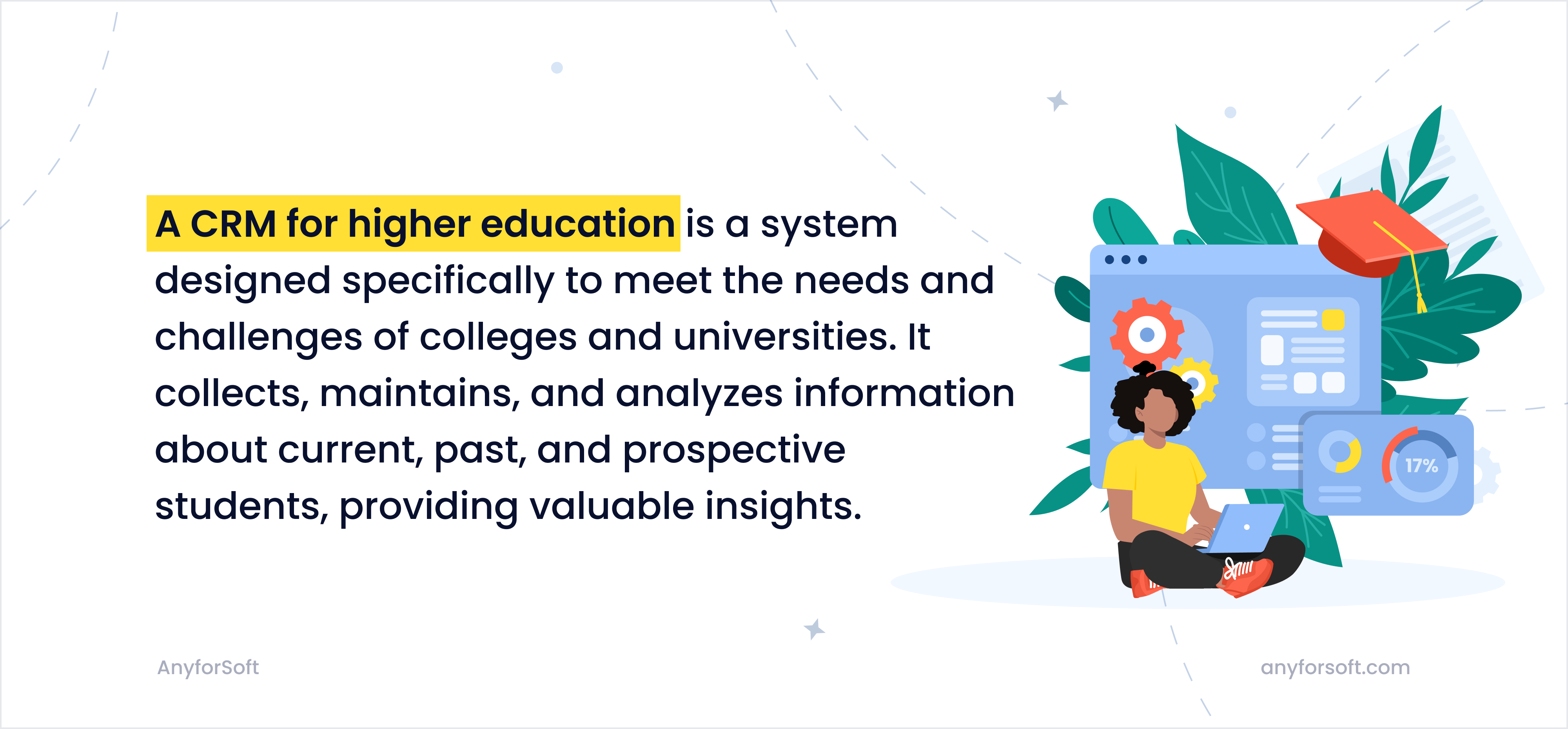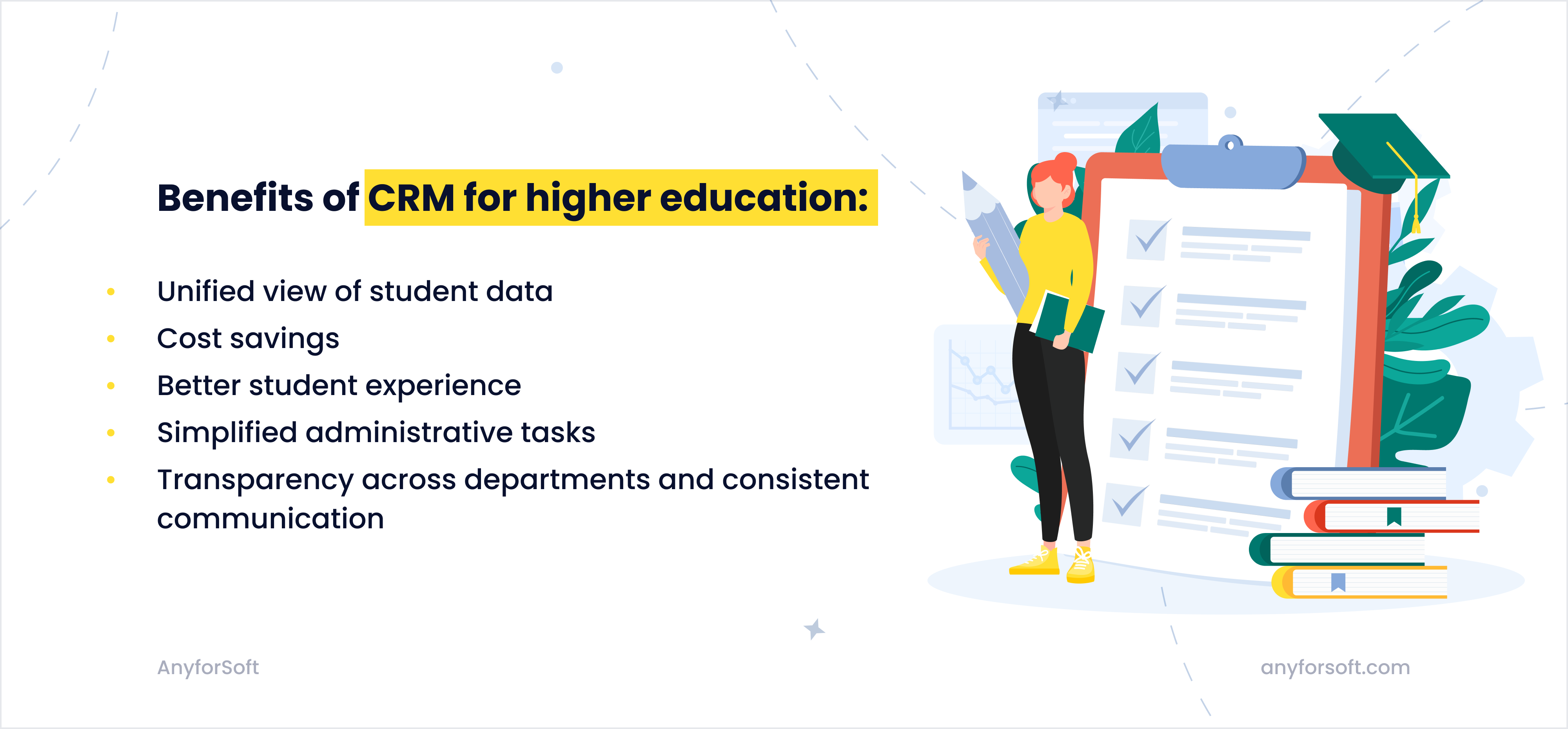In our recent article on how to build a CRM, we discussed customer relationship management software and its benefits for multiple industries. This time we would like to focus exclusively on the higher education sector.
Customer relationship management (CRM) solutions help educational institutions engage with students at every stage of their journey. They facilitate student enrollment, increase operational efficiency, streamline communication and collaboration, and improve student success and retention. No wonder the higher education CRM market is growing rapidly and is projected to reach $5 billion by 2032.
Investing in custom CRM development services opens many opportunities for educational organizations, and AnyforSoft is here to discuss them. You’re about to learn:
- What is a CRM for higher education?
- Why is it important?
- What benefits can it bring to education institutions?
- What features to look for in CRM software?
- What are the best customer relationship management tools in the industry?
- How to choose the right tool?
Without further ado, let’s get started!
What is a CRM in higher education?
A higher education CRM is a customer relationship management system with functionality designed to meet the unique needs and challenges of higher education institutions. It enables them to collect, maintain, and analyze information about current, past, and prospective students. These solutions are used to make critical touchpoints throughout the student lifecycle, helping learners at every stage, from admission to graduation day.
Of course, CRM software solutions simplify the working routine of university staff members as well. More specifically, they facilitate both internal and external communication. Since education data is accessible cross-departmentally, everyone who interacts with a student can log information about the student experience, which allows seamless data exchange and a comprehensive understanding of each student's journey.
CRM software for higher education integrates with other education tools, enabling effective management of administrative tasks. You can connect it with learning management systems, school management software, student information systems, event management instruments, and other solutions.

The importance of a CRM in higher education
Why are CRM solutions important for educational institutions? We can give you at least three reasons:
- CRM platforms allow colleges and universities to support new business models and deliver personalized student experiences without the hassle of updating their legacy systems. They enable faculty and staff to collaborate from anywhere and track critical student metrics across different channels.
- CRM systems for higher education help institutions consolidate insights across student experience, marketing, recruitment and admissions, and performance in one channel, offering a unified view. That way, they don’t need to rely on different tools and have student data scattered across them.
- Last but not least, higher education CRMs free up time for faculty and staff members to focus on core activities. They simplify and automate many administrative tasks, removing redundant workload. With the right CRM platform, a college or university can provide a personalized experience for each student, automate workflows, increase alumni engagement, and ensure student success.
Read also: Drupal for Higher Education Institutions—Why It's the Top Choice.
Benefits of CRM in higher education
Now that we’ve defined a CRM for higher education and discussed why it is important, let’s talk about how these tools benefit the education industry.

Unified view of student data
According to Salesforce, an average university relies on 35 applications to manage the student journey. With this approach, the critical student data exists in silos, causing a lack of connectivity and spoiling the student experience. An education CRM system addresses this issue, helping colleges and universities connect all the critical insights in one place. It creates a 360-degree view of every student, allowing organizations to make data-driven decisions. That way, they can shape personalized interactions with learners and put student relationships at the forefront.
Cost savings
Using a CRM platform, a higher education institution can not only conveniently access critical student data, but also save costs. Instead of relying on multiple systems, it can use an integrated customer relationship management tool with all the features it needs. CRM systems cut the expenses associated with the adoption of outdated processes and updating legacy systems, allowing colleges and universities to save their resources and invest them in something valuable.
Better student experience
A CRM for education helps institutions cater to student needs by providing valuable tools such as timely alerts, conversational chatbots, etc. By making the enrollment journey easier for learners, providing effective communication, enabling quick access to information, and streamlining support services, educational organizations can boost student engagement, retention, and experience. For example, Central New Mexico Community College increased student retention by 6.8% after switching to a CRM platform.
Simplified administrative tasks
Higher education CRM solutions help faculty and staff simplify and automate administrative tasks, freeing their time for more important work. For example, they can automate emails and follow-ups for event notifications, application statuses, and similar processes. They can also take a vast majority of repetitive activities, such as data entry and document submission reminders. These tools also streamline the admissions process by helping university staff track the status of applications, manage applicant documents, and effectively communicate with prospective students.
Transparency across departments and consistent communication
As noted above, customer relationship management in higher education makes data accessible across different departments, allowing them to make well-informed decisions. This way, a CRM system promotes clarity, improving the business and administrative culture of higher ed institutions. In addition to that, it can serve as a messaging hub to contact students. It allows university staff to notify students of financial requirements, send acceptance letters, update personal contact information, and much more.
For all these reasons, educational organizations invest in education software development, building robust CRM solutions.
Features to look for in higher education CRM systems
The market offers a myriad of customer relationship management tools for educational organizations. To choose the right solution, you should first determine the features your organization needs and then find a CRM that supports them. Here’s a list of features that any CRM for higher educational institutions should have on board:
- Application management—to streamline application submissions and reviews.
- Student profile—to have centralized access to important student information (academic records, enrollment history, contact details, etc.).
- Enrollment management—to effectively manage the enrollment process.
- Early warning system—to identify students at risk of dropping out and make timely interventions.
- Communication tools—to stay in touch with students and assist them in their journeys.
- Fundraising management—to manage donations and other fundraising activities.
- Progress tracking—to track student progress along with grades, attendance, and behavioral records.
- Reporting—to receive valuable insights and make data-driven decisions.
- Document management—to streamline document management and ensure paperless admissions and records.
- Third-party integrations—to enrich the functionality of your platform. The system should integrate with LMSs, payment gateways, email marketing platforms, student information systems, campus management software, and event management solutions.
Best CRM software for higher education: top 5 tools
To help you find the best CRM for your educational organization, we’ve cherry-picked five tools that, in our opinion, offer the highest quality solutions.
1. Salesforce Education Cloud

Salesforce Education Cloud is a CRM for higher education that allows organizations to understand and predict student needs throughout their education journey. The platform helps educational institutions of all sizes streamline operations, accelerate support, and evolve new learning models. It enables them to manage student data in one place, unify the student experience, and assist students with AI-powered chatbots.
What makes Salesforce Education Cloud the best CRM for higher education is its scalability, extensive integration capabilities, and exceptional reliability. Founded in 1999, Salesforce has been providing its services for over 24 years, making it one of the most long-lasting customer relationship management systems available.
Key Features of Salesforce Education Cloud:
- Student lifecycle management.
- Application review console.
- Prospective student timelines.
- Appointment scheduling.
- Data-driven alerts.
- Intelligent question generator.
- Alumni engagement portal.
- Fundraising management.
- Marketing automation.
- Einstein AI (NLP, predictive analytics, automation, personalization, chatbot).
Pricing:
Salesforce offers two Education Cloud pricing plans:
- Enterprise Edition: $81.25 per user/month.
- Unlimited Edition: $138.75 per user/month.
2. Slate

Slate is a CRM for higher education that helps build strong relationships throughout the college admissions process by offering advanced data-sharing capabilities. Designed for students, counselors, and colleges, the platform provides a wide set of useful features, from application management to collaboration tools. What makes Slate one of the best higher education CRM solutions is that it’s completely free while being on par with paid tools.
Slate is used by over 450 higher education institutions, including top 25 universities, liberal arts institutions, art schools, HBCUs, and large state flagship universities. The CRM allows you to monitor the progress of your students in a convenient way and update applications with official school records when such a need arises.
Key features of Slate:
- Application management.
- Collaboration tools.
- Progress tracking.
- File sharing.
- Data analytics.
Pricing:
The tool is free for everyone.
3. Hubspot

HubSpot is one of the most popular AI-powered CRM platforms that offers an extensive toolset for every industry. For educators, the organization provides instruments to recruit applicants, track students, and engage donors. Colleges and universities all over the globe use this CRM to build personalized experiences, gain insights into student engagement, retention, and performance, and create dependable relationships to support ongoing connections.
According to HubSpot’s official website, organizations that integrate the platform into their workflows see 215% more website traffic, 310% more inbound leads, and a 73% increase in deals closed in the first 12 months.
Key features of HubSpot:
- Contact management.
- Third-party integrations.
- Data analytics.
- Application management.
- Student portal.
- Knowledge base.
- Live chat.
Pricing:
HubSpot offers four subscription options:
- Free: $0 per user/month.
- Starter: $15 per user/month.
- Professional: $800 per month.
- Enterprise: $3600 per month.
Read also: Future of Education Technology: 6 Key Edtech Trends
4. Zoho Education CRM

Zoho Education CRM is a tool that allows educational organizations to boost student interest, increase enrollments, and streamline operations. It provides a tool suite for managing the complete admissions lifecycle, increasing student engagement, and converting prospects into students. Using this CRM, you can automate follow-ups, emails, alerts, and notifications, saving time for more important activities.
Zoho Education CRM benefits the entire educational sector, helping institutions nurture relationships with students, parents, staff, donors, and alumni. It also supports integrations with more than 100 popular applications, allowing organizations to connect with existing tools and platforms for productive work.
Key features of Zoho Education CRM:
- Self-service portals for teachers, students, parents, and admins.
- Third-party integrations.
- Admissions management.
- Automation of marketing campaigns.
- Collaboration tools.
- 360-degree view of student profiles.
- Workflow automation.
- In-depth reporting and analytics.
Pricing:
Zoho Education CRM has four pricing plans:
- Standard: $14 per user/month.
- Professional: $23 per user/month.
- Enterprise: $40 per user/month.
- Ultimate: $52 per user/month.
5. TargetX

TargetX is an educational CRM that offers a toolset for full student lifecycle management. It helps organizations boost applications, transform enrollment management, and increase admissions productivity with an intuitive and mobile-friendly platform built specifically for the education sector. Having over 21 years of experience, TargetX delivers solutions that power student success initiatives and redesign the student experience.
Over 400+ colleges and universities consider TargetX the top CRM for higher education. It allows them to support students at every stage of their journey, ensuring high engagement and retention along with the smoothest experience.
Key features of TargetX:
- Event management.
- Contact management.
- Student success center.
- Action plans.
- Appointment scheduler.
- Insights and analytics.
- Admissions process management.
Pricing:
Pricing information is not specified by the vendor. Visit the official website of TargetX to request a quote.
How to choose the right CRM for higher education: factors to consider
Now that we’ve showcased the best CRMs in the industry, the next question is, how to choose the right tool? You already know what features to consider, but what else should you take into account to find the best solution?
Well, here are seven tips to help you out:
1. Outline your pain points. Every educational institution has pain points it struggles with. The first thing you should do is determine what your struggles are. What goals have you trouble meeting? What systems aren’t working for your organization? Write down your hardest challenges and how you expect your future CRM platform to address them.
2. Make a list of programs and systems you currently use. You must have some tools that you use for admissions, student engagement, alumni management, recruitment, and other activities. Make a list of them so that you can evaluate each system. Consider how well they’re working now and how well they might do it in the future (when integrated with your CRM). Some of these systems may become redundant, so you’ll likely give up them. Ideally, you should strive to find a CRM that can replace all the instruments you’re currently using.
3. Set your budget. Both ready-made and custom CRMs are expensive. The former charges for every user you bring to the platform, resulting in high monthly fees. The latter requires significant upfront investments. Therefore, it’s a good idea to set your budget before opting for any solution.
4. Compare features. Once your budget is set, visit the websites of CRMs you’re interested in and compare their features. Try to find the platform that offers the best quality-price ratio.
5. Read client testimonials. Use specialized platforms like Clutch and Capterra to find client testimonials about CRMs. They will give you an idea of the pros and cons of each solution, helping you find the most suitable one.
6. Narrow your list. You may start with a dozen different CRM providers, but after comparing their features and reading client testimonials, you will be left with no more than 5-7 potential options. Once your list has shrunk, request demos. Test each platform from your list and choose the one that offers the best functionality for optimal price.
Wrapping up
Higher education CRMs are invaluable tools that allow colleges and universities to deliver the best student experience while increasing retention. They automate most administrative tasks, freeing up time for faculty and staff to do more important work. From a business perspective, these solutions help organizations save resources by streamlining the admissions process, improving communication, and centralizing student data. Instead of relying on different costly systems, an institution can invest in an integrated CRM platform and access everything it needs from one place.
If you also want to benefit from advanced customer relationship management software, we can help. Having over 12 years of development experience, AnyforSoft builds tools of any complexity. As a customer-oriented company, we always strive to meet the needs and requirements of our customers, ensuring their satisfaction with the end product. We will help you stand out from the competition and create exceptional products that resonate with your audience.
Contact us today and tell us about your project.
